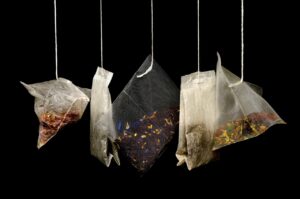As an Amazon Associate, Itsallinthetealeaf.com earn from qualifying purchases.
The Soothing Elixir:Herbal Teas and Health Benefits
For centuries, herbal teas have been cherished as natural remedies for various ailments and valued for their calming and refreshing qualities. Made from a diverse array of plants and herbs, these aromatic brews have gained popularity worldwide due to their health benefits and delightful flavours. In this article, we delve into the fascinating realm of herbal teas, exploring their types and the many ways they can enhance our well-being.

Types of Herbal Teas: Herbal teas, also known as tisanes, are caffeine-free infusions made from dried flowers, leaves, fruits, seeds, or roots of various plants. The wide variety of herbs and plants available allows for an extensive range of herbal tea types, each with its unique characteristics and flavours. Some popular types of herbal teas include:
Chamomile Tea:
Renowned for its gentle and soothing properties, chamomile tea is made from dried chamomile flowers. It is often consumed to promote relaxation, improve sleep, and ease digestive discomfort.
Peppermint Tea:
for its refreshing and invigorating taste, peppermint tea is made from dried peppermint leaves. It is commonly used to aid digestion, alleviate headaches, and provide relief from nasal congestion
Lemon Balm Tea:
Lemon balm tea, derived from the lemon-scented herb, is appreciated for its calming effects on the mind and body. It is often used to reduce stress, anxiety, and promote better sleep.Lorem ipsum dolor sit amet, consectetur adipiscing elit. Ut elit tellus, luctus nec ullamcorper mattis, pulvinar dapibus leo.
Ginger Tea:
Made from the root of the ginger plant, this tea offers a warming and spicy flavour. Ginger tea is frequently used to ease nausea, soothe sore muscles, and boost the immune system.
Echinacea Tea:
Derived from the echinacea plant, this tea is believed to bolster the immune system and aid in preventing or reducing the duration of cold and flu symptoms.
Hibiscus Tea:
Hibiscus flowers create a vibrant and tangy tea that is rich in antioxidants. It may help lower blood pressure, improve heart health, and support weight management.
Rooibos Tea:
Hailing from South Africa, rooibos tea boasts a sweet and nutty taste. Rich in antioxidants, it is often consumed to support skin health and boost the immune system.
Lavender Tea:
Lavender flowers yield a fragrant and calming tea that is celebrated for reducing stress and promoting relaxation.
Health Benefits of Herbal Teas:
Health Benefits of Herbal Teas: Beyond their delightful flavours, herbal teas offer an array of health benefits that have been recognised by traditional medicine and, in some cases, supported by scientific research. Some of the significant health benefits associated with herbal teas include:
Improved Digestion: Several herbal teas, such as peppermint and ginger, can aid digestion, reduce bloating, and alleviate indigestion or stomach discomfort.
Stress and Anxiety Relief: Chamomile, lemon balm, and lavender teas have calming properties that can help reduce stress and anxiety levels, promoting a sense of relaxation.
Enhanced Sleep Quality: Chamomile and valerian root teas are well-known for their sedative effects, which can improve sleep quality and help with insomnia.
Immune System Support: Herbal teas like echinacea and ginger are believed to strengthen the immune system, helping the body fight off infections and illnesses.
Antioxidant Properties: Many herbal teas, including hibiscus and rooibos, are rich in antioxidants that combat free radicals and promote overall health.
Heart Health: Hibiscus tea has been associated with lowering blood pressure and cholesterol levels, supporting cardiovascular health.
Cold and Flu Relief: Herbal teas like elderberry and ginger can provide relief from cold and flu symptoms, thanks to their immune-boosting and anti-inflammatory properties.
Brewing Tips and Precautions:Add Your Heading Text Here
To extract the maximum benefits and flavors from herbal teas, proper brewing techniques are essential. Here are some general tips to follow:
- Water Temperature: Most herbal teas are best brewed with boiling water, but some delicate flowers and leaves may benefit from slightly cooler water around 90-95°C (194-203°F).
- Steeping Time: Herbal teas generally require 5-10 minutes of steeping time, but this can vary depending on the type of tea and personal preference.
- Sweeteners: If desired, sweeten herbal teas with natural honey, agave syrup, or stevia for a healthier alternative to refined sugar.
As with any natural remedy, it’s important to exercise caution and consult with a healthcare professional, particularly if you have existing medical conditions, are pregnant, or are taking medications that may interact with certain herbs.
Conclusion: Herbal teas offer a delightful and healthful way to incorporate the goodness of nature into our daily lives. With their diverse flavors and numerous health benefits, they serve as a soothing elixir that not only pleases the senses but also supports overall well-being. So, the next time you crave a warm and comforting beverage, consider steeping a cup of herbal tea and savouring the goodness it brings. Cheers to the natural wonders that herbal teas offer, nurturing both body and mind in the most delightful way possible.